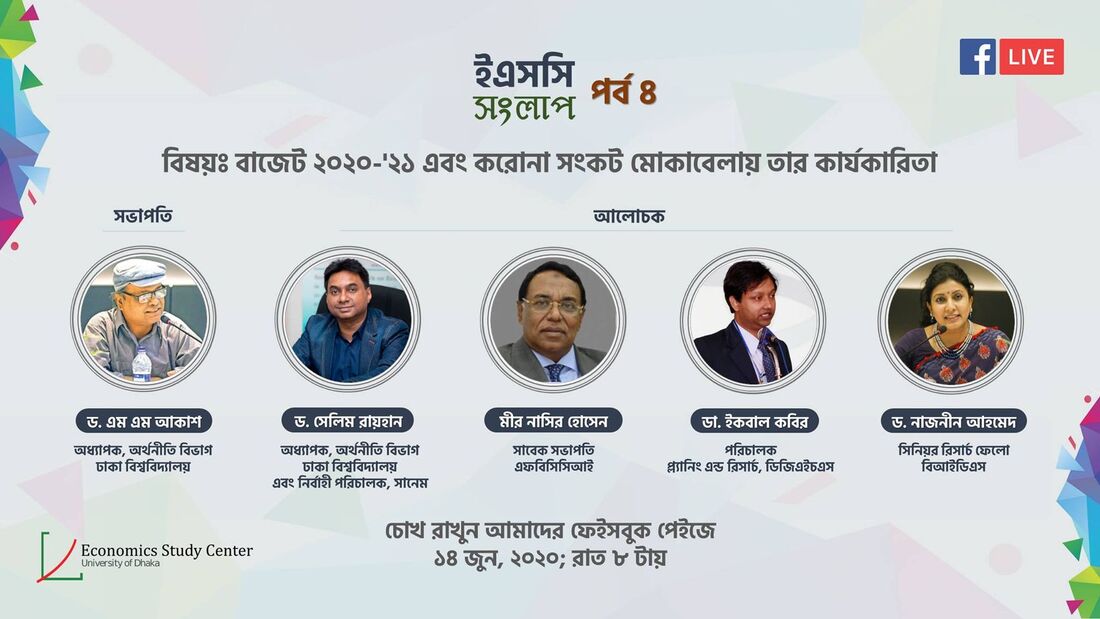ECONOMICS STUDY CENTER, UNIVERSITY OF DHAKA
|
The fourth episode of ESC Dialogue, an online event was organized by Economics Study Center (ESC) on 14 June 2020. The event went on air at 8pm from the ESC's official Facebook page. The topic for discussion was “Budget 2020-21 and its effectiveness to fight against COVID-19 crisis.” ESC Dialogue: Episode 4 was moderated by Dr. M. M. Akash, professor of the Department of Economics at University of Dhaka. Dr. Selim Raihan, professor of the Department of Economics at University of Dhaka and executive director of SANEM; Mir Nasir Hossain, former president of FBCCI; Dr. Iqbal Kabir, director of Planning and Research, DGHS; and Dr. Nazneen Ahmed, senior research fellow of BIGD were present as discussants in this dialogue. The discussants highlighted the sectors such as agricultural, industrial, health sectors that can be affected the most due to COVID-19 crisis and reasoned how the upcoming budget is important to recover these sectors. They also argued on whether this budget is susceptible to reduce poverty and aid those poor people who are seriously getting affected due to this global pandemic. Tanjim UL Islam, the president of ESC, started the session by introducing the chair and the discussants. At first, Dr Nazneen shared her point of view on the budget. According to her, the general people were eager to see how much allotment is given to the health sector, social security, and the post-pandemic world. Dr. Nazneen added that it is not about achieving 8.2% growth rate anymore. If the growth rate remains positive, it is enough for us. But we need to ensure the social security and employment of people. All the migrant workers cannot be absorbed in the agricultural sector. There should be a separate and a clear plan for these new unemployed workers as well as proper surveillance is needed to assure that the tax incentives for the industrial sector is also used for the welfare of the workers.
According to Dr. Iqbal, it is high time we needed a healthy budget, not a normal budget. A healthy budget will not only focus on the growth but also concentrate on the farmers' and workers' health. He said that there is an allotment of 100 crore taka for research in the health sector. However, he is worried that the plan is not specific enough to take place. He also emphasized on the decentralization of the health sector. Division-wised plan of the health sector will reduce the pressure on the Capital or the Dhaka city which will ensure the medical care of all types of people according to him. Mir Nasir Hossain expressed his concern on the poor preventive plan for the COVID-19 crisis. Most of the countries have ended lockdown during the lower COVID-19 cases, but Bangladesh has ended its lockdown when the COVID-19 cases are increasing. It is highly inappropriate. He said that we need to ensure the safety of the workers' health if we want to develop as a country. He supported the tax cut in the corporate tax system. However, he is concerned the tax cut can affect the consumers as most of people who are capable of paying taxes are reluctant about it. Only 20-22 lakh people pay tax fairly in Bangladesh. He also added that the banking sector's cash flow loan should not be hampered due to the extreme pressure or dependence on this sector. Dr. Selim Raihan said that there is less acknowledgement of the current crisis and it is noticeable on the budget. It's focused on the COVID-19 crisis, but the infrastructure or the plan is not described in details. This budget doesn’t offer much for those people who are facing problems due to other issues or diseases besides COVID-19. According to him, the allotment in the health sector, for the non-COVID-19 patients,has increased by only 1,000 crore taka, which is not enough. 85% people are involved in the informal sector where the income is not fixed. There is no transparent plan for them or for the increased number of poor people. Dr. Selim said that the government should have a plan to include the private hospitals to deal with the shortage of the medical equipment and assure that no one dies without treatment amid this pandemic. All agreed that the budget has highlighted important sectors and the allotment in these sectors have increased but it is not sufficient. And the proper planning is somehow missing. They emphasized that the government needs to focus on both employment and people’s safety. According to them, the health sector is often neglected. Just because of the lack of a proper infrastructure, this sector is failed to use its allotment properly every year. It is not about increasing the allotment in this sector anymore. It is about ensuring whether this allotment is used sufficiently or not. At the end of the dialogue, the floor was opened for all to express their views and ask questions to the respected guests. In addition, Economics Study Center (ESC) is a student organization of the Department of Economics, University of Dhaka. It organizes different events to create a platform both online and offline for experts and students to discuss on various national and international economic issues. The target of the episodes of ESC Dialogue is to highlight experts' views on the current economic issues.
0 Comments
Leave a Reply. |
|
||||||

